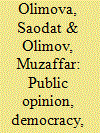|
|
|
Sort Order |
|
|
|
Items / Page
|
|
|
|
|
|
|
| Srl | Item |
| 1 |
ID:
138079


|
|
|
|
|
| Summary/Abstract |
This article investigates whether attacks against Israeli targets help Palestinian factions gain public support. We link individual-level survey data to the full list of Israeli and Palestinian fatalities during the period of the Second Intifada (2000– 2005) and estimate a flexible discrete choice model for faction supported. We find some support for the ‘‘outbidding’’ hypothesis, the notion that Palestinian factions use violence to gain prestige and influence public opinion within the community. In particular, the two leading Palestinian factions, Hamas and Fatah, gain in popularity following successful attacks against Israeli targets. Our results suggest, however, that most movement occurs within either the secular groups or the Islamist groups, but not between them. That is, Fatah’s gains come at the expense of smaller secular factions, while Hamas’s gains come at the expense of smaller Islamic factions and the disaffected. In contrast, attacks by the Palestinian Islamic Jihad lower support for that faction.
|
|
|
|
|
|
|
|
|
|
|
|
|
|
|
|
| 2 |
ID:
134143


|
|
|
|
|
| Publication |
2014.
|
| Summary/Abstract |
Based on Tajikistan's experience, this article examines the evolution of views, values, and preferences of the population of the Central Asian (CA) countries that support the sustainability of their political regimes. Based on public opinion poll results, this article presents the population's preferences regarding the political system, sheds light on its attitude toward state power and its institutions, and gives assessments of the current regime and efficiency of different forms of citizen engagement. It also looks at the ways citizens participate in state governance and how effectively value judgments are being implemented.
The paper shows that despite the differences in the traditional social institutions of the CA states, as well as in the development paths they have chosen, they are all evolving according to the neopatrimonialism model. However, the evolution of political views in the CA societies shows that democratic values and preferences continue to occupy an important place in the mass consciousness. From this it follows that the government's necessitated support of certain elements of democracy is generated not only by its desire to create a façade or its willingness to make concessions to foreign donors and the international community, but also by social pressure. At the same time, the population's political views and preferences are contradictory and fragmented. They form the base for mass support of democracy, on the one hand, and for social consensus regarding restrictions of citizen rights and recognition of the privileges of heads of state, including patrimonial supremacy, on the other.
|
|
|
|
|
|
|
|
|
|
|
|
|
|
|
|
| 3 |
ID:
193268


|
|
|
|
|
| Summary/Abstract |
The new modernization theory has suggested that the pervasiveness of traditional values has a clear impact on the quality of democratic governance. In this contribution to this special issue on the political consequences of traditional beliefs, we explore whether and to what extent the pervasiveness of traditional values and beliefs has a detectable impact on authoritarian attitudes. Specifically, we analyze the relationship between the support for a “strongman” and the acceptability of traditional practices for Muslim respondents from 27 jurisdictions. The results suggest that those who believe that traditional practices, such as the use of sorcery, appealing to jinn, and to the souls of ancestors, are acceptable under Islam are more likely to prefer a strongman to democracy. Notably, we found that respondents’ religiosity does not significantly affect their support for a strongman, raising questions about how accurately traditionality has been measured so far.
|
|
|
|
|
|
|
|
|
|
|
|
|
|
|
|
|
|
|
|
|